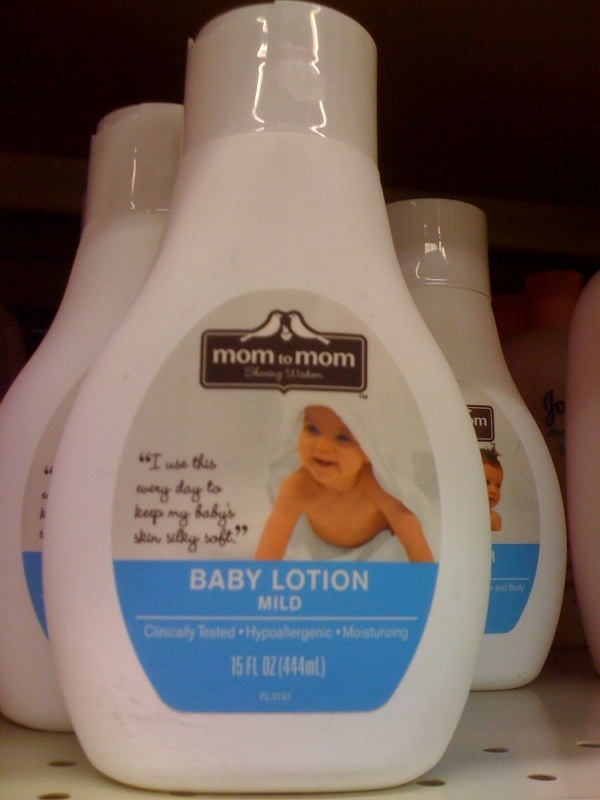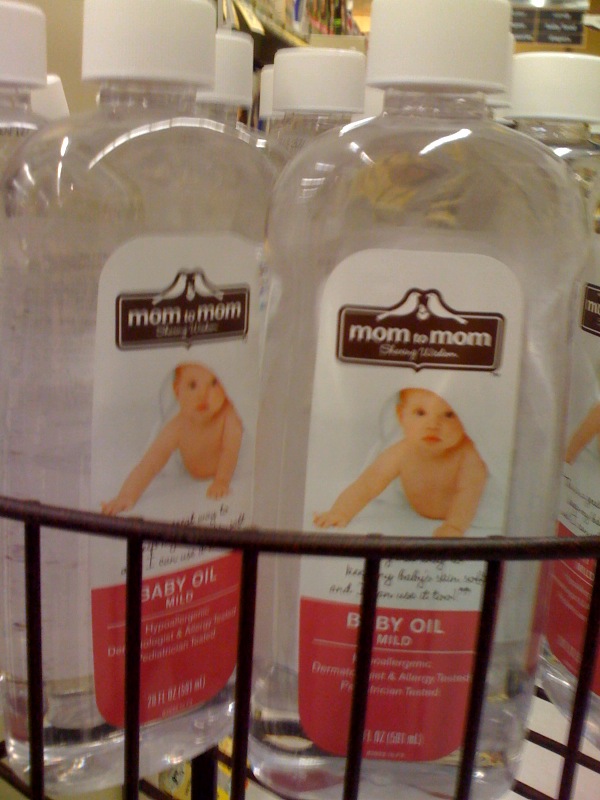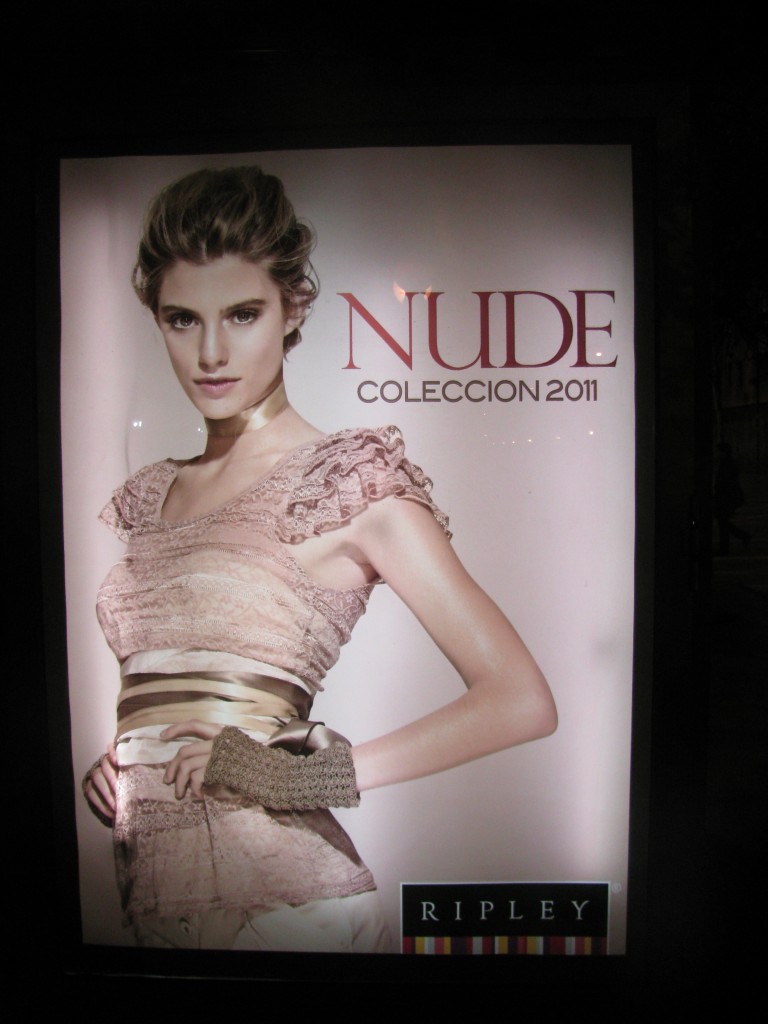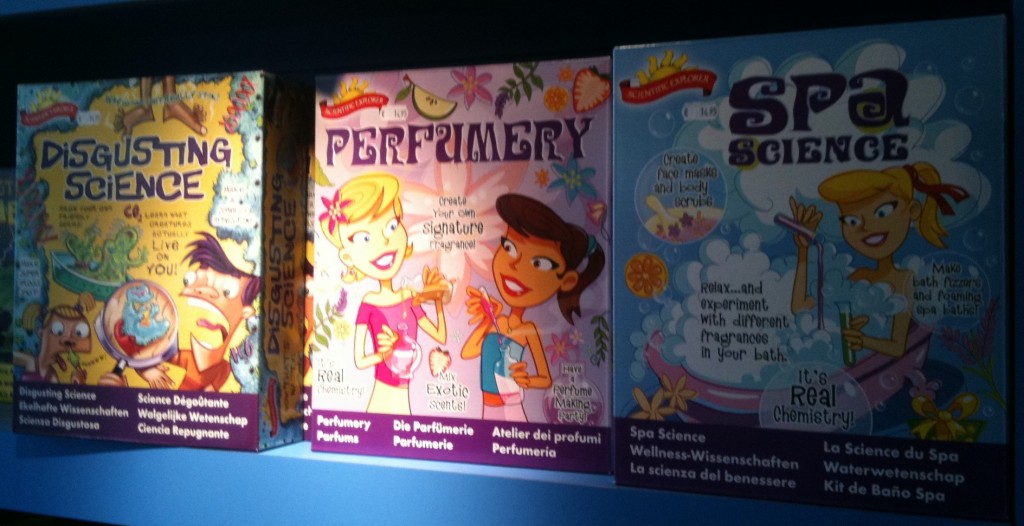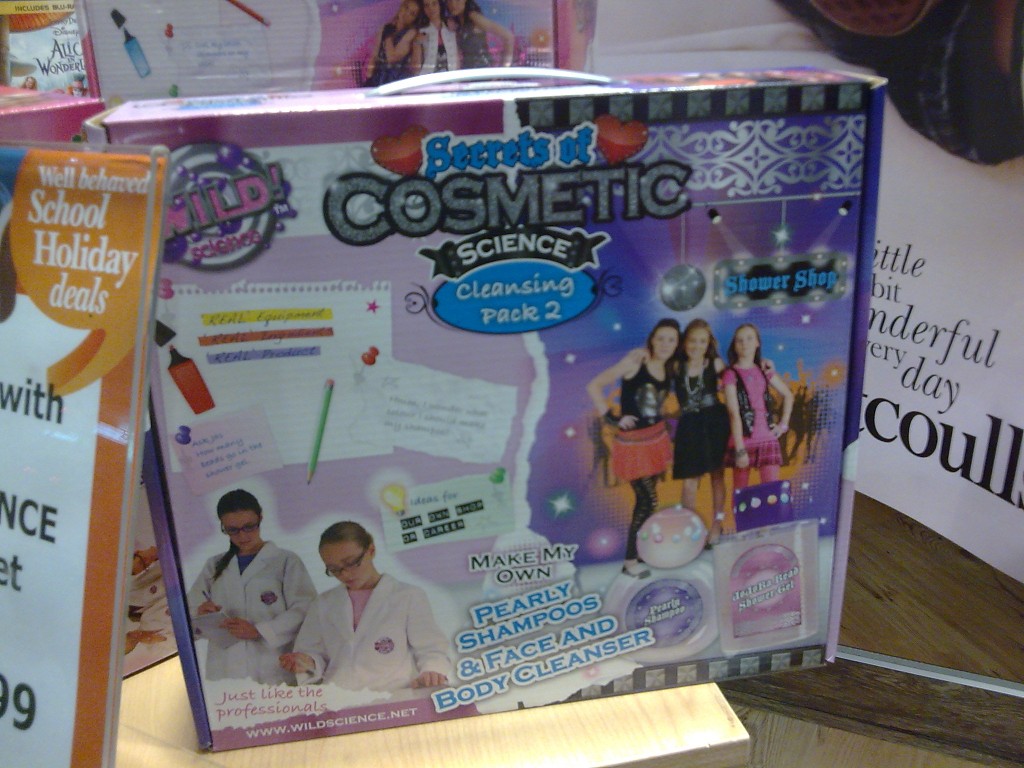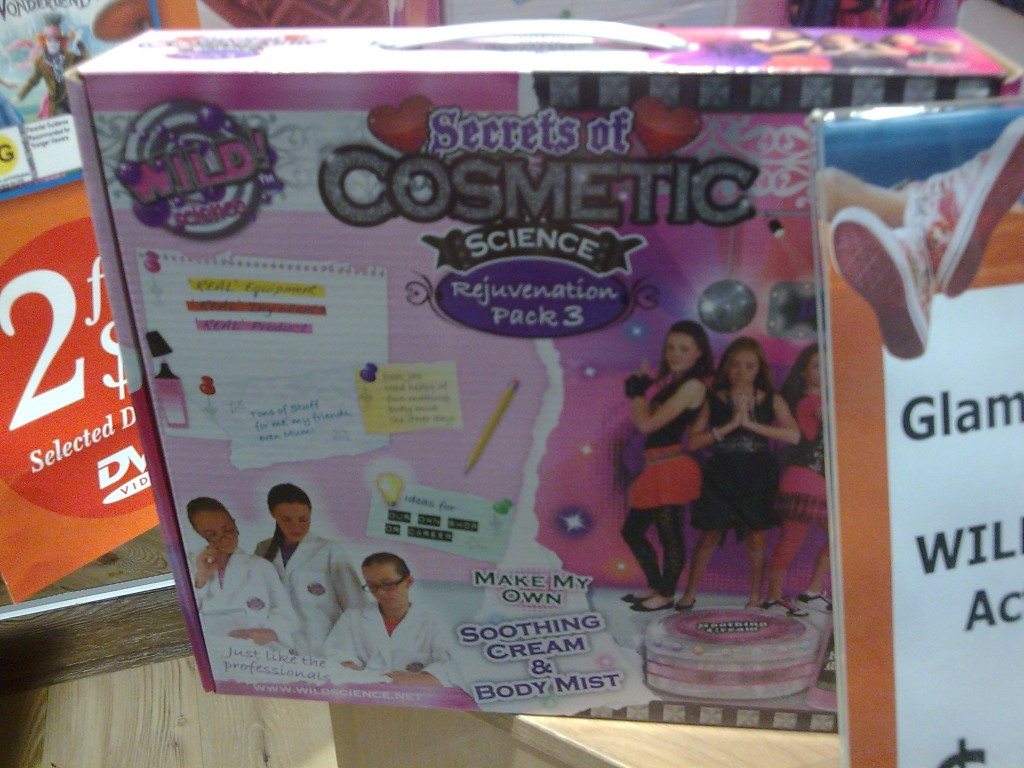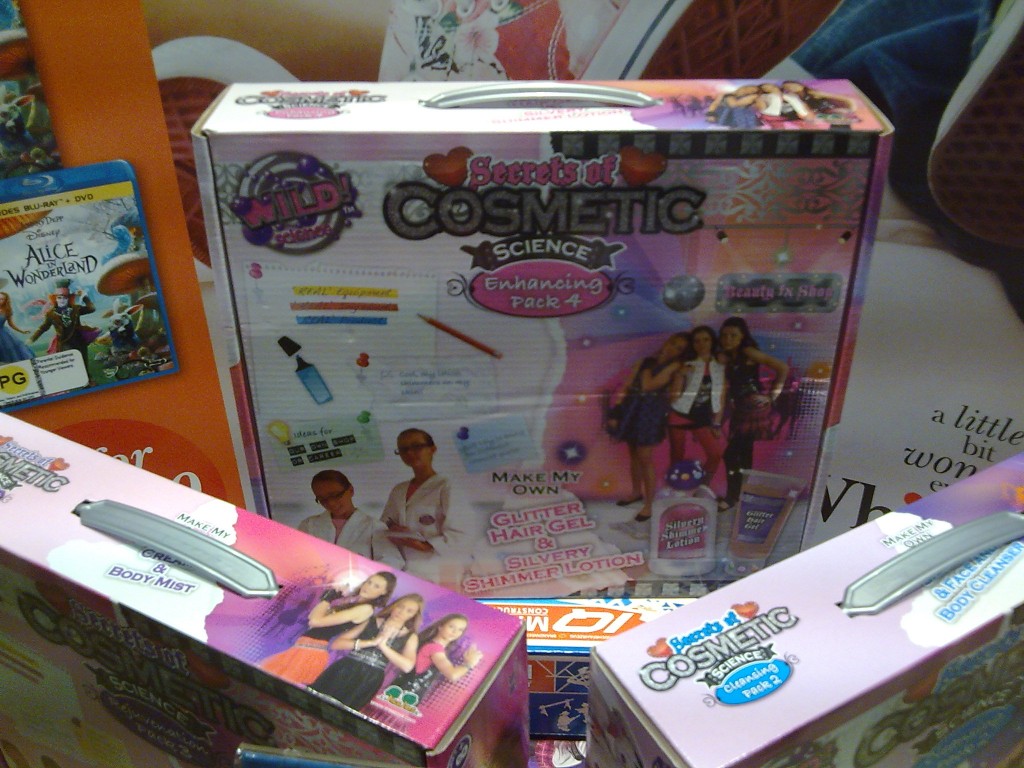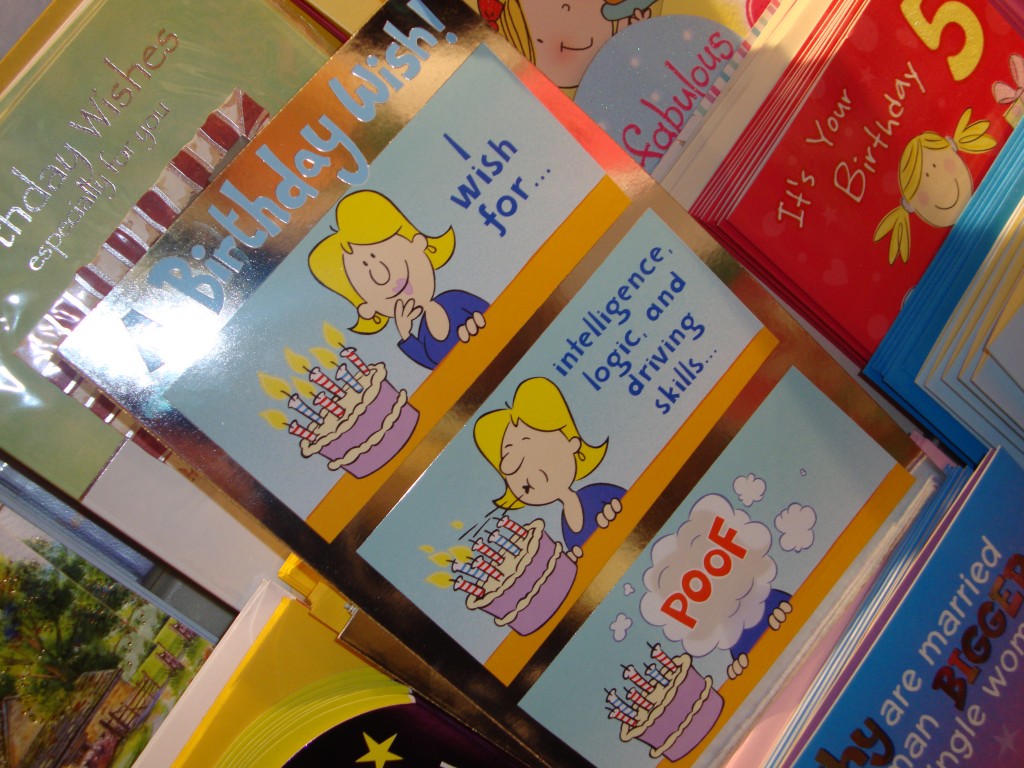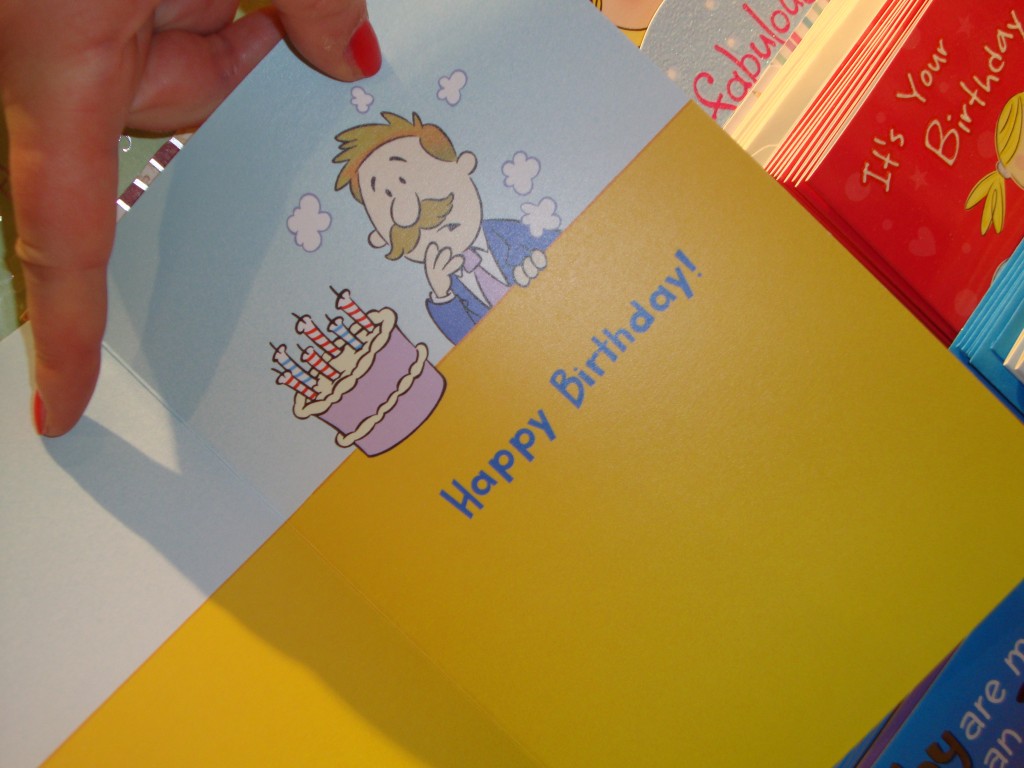Jenny Knopinski snapped these photos of the new Safeway brand of baby care products, Mom to Mom. The branding of the product as “for moms, by moms” is another great example of the way that mothers are held responsible for childcare, while fathers are simultaneously excluded from the sphere altogether.
Lisa Wade, PhD is an Associate Professor at Tulane University. She is the author of American Hookup, a book about college sexual culture; a textbook about gender; and a forthcoming introductory text: Terrible Magnificent Sociology. You can follow her on Twitter and Instagram.This two-minute clip from Toddlers and Tiara’s (a reality show about child beauty pageants), sent in by Dmitriy T.M., is a great example of how mothers teach their daughters that beauty hurts… and that pain is a price they should be willing to pay:
Lisa Wade, PhD is an Associate Professor at Tulane University. She is the author of American Hookup, a book about college sexual culture; a textbook about gender; and a forthcoming introductory text: Terrible Magnificent Sociology. You can follow her on Twitter and Instagram.
We’ve written several posts about how the words “nude” and “flesh” tend to be used to refer to colors associated with light-colored skin. For examples, see our posts on “flesh-colored,” Michelle Obama’s “nude” colored dress, the new in-color, “nude is the new black” (and by black we mean white), lotion for “normal to darker skin,” and color-assisted medical diagnosis. Readers have sent in an additional example and several counter-examples.
Catherine M.P. snapped this photo of an ad for Ripley in Santiago, Chile (she says English is often used to make a product seem “edgy”):
Lisa Wade, PhD is an Associate Professor at Tulane University. She is the author of American Hookup, a book about college sexual culture; a textbook about gender; and a forthcoming introductory text: Terrible Magnificent Sociology. You can follow her on Twitter and Instagram.Chen and Kristyn both sent in examples of gendered chemistry sets.
Chen found this example at Nemo, a science museum in Amsterdam. Notice that the kit with boys on it a boy in the foreground and a girl in the background is “Disgusting Science” and the kits with only girls on it are “Perfumery” and “Spa Science”:
Meanwhile Kristyn spotted these Cosmetic Science kits in Auckland, NZ. There were apparently at least four different kits aimed at making beauty products for girls.
Cleansing Pack 2, featuring Pearly Shampoos and Face and Body Cleanser:
Rejuvenation Pack 3, featuring Soothing Cream and Body Mist:
Enhancing Pack 4, featuring Glitter Hair Gel and Silvery Shimmer Lotion:
Lisa Wade, PhD is an Associate Professor at Tulane University. She is the author of American Hookup, a book about college sexual culture; a textbook about gender; and a forthcoming introductory text: Terrible Magnificent Sociology. You can follow her on Twitter and Instagram.
Sociologist Geographer David Harvey’s analysis of the current economic crisis is engagingly illustrated in this 11-minute video. Harvey evaluates individual, institutional, ideological, cultural, and policy explanations for the recession. He then explains Marx’s insights into the “internal contradictions of capital accumulation”: capitalists want to pay low wages, but if they’re paying low wages, then no one can buy their stuff. If both high wages and low wages translate into no profits, where does that leave capitalism?
From Cognitive Media via BoingBoing and Karl Bakeman.
Buy Harvey’s book, The Enigma of Capital and the Crises of Capitalism.
Lisa Wade, PhD is an Associate Professor at Tulane University. She is the author of American Hookup, a book about college sexual culture; a textbook about gender; and a forthcoming introductory text: Terrible Magnificent Sociology. You can follow her on Twitter and Instagram.Muriel Minnie Mae and an anonymous contributor sent in contrasting examples of cell phone marketing that draws on the idea of nature. The two ad campaigns, side by side, are a great illustration of how we can imagine nature to be either our enemy or our friend.
The campaign for the Motorola Brute portrays nature as aggressive and destructive. The Brute is designed to beat nature in this battle (anthropomorphized as “mother”) by being able to withstand “extreme temperatures, blowing rain, dust, shock, vibration, pressure and humidity…” Mother nature is a bitch, indeed! She does deserve a slap in the face!
In dramatic contrast, this ad for AT&T cellular service portrays nature as the source of grace and beauty. Cell phones bloom out of flowers and are carried on the wind by dandelion fluff:
The two examples together show us that the nature of nature is socially constructed; humans portray it in multiple ways, using it as a resource to tell stories about ourselves… and cell phones.
Lisa Wade, PhD is an Associate Professor at Tulane University. She is the author of American Hookup, a book about college sexual culture; a textbook about gender; and a forthcoming introductory text: Terrible Magnificent Sociology. You can follow her on Twitter and Instagram.Ellen B. found this birthday card for sale in Dublin. The front cover reads “I wish for… intelligence, logic, and driving skills…”
Wait for it… … …
Gwen and my thought process as we moved from the first to the second image: “…’POOF’… oh it’s not… it better not… oh no it did!”
Lisa Wade, PhD is an Associate Professor at Tulane University. She is the author of American Hookup, a book about college sexual culture; a textbook about gender; and a forthcoming introductory text: Terrible Magnificent Sociology. You can follow her on Twitter and Instagram.
Amanda M. and Lisa C. both submitted a recent Toy Story 3-themed commercial for Visa, pointing out how nice it is to see the Buzz Lightyear character advertised to girls.
I won’t disagree that it’s nice that girls are being included in the marketing for Toy Story 3 (especially as the movie appears to be as boy-centric as most), but I don’t see it as revolutionary. In fact, because we largely value masculine characteristics and pursuits, the idea that girls would be interested in boy things (like space travel) is generally regarded as cute, neat, or even awesome (this is why I like to order bourbon neat on a first date — impresses the men every time). The problem is that the reverse is not true. Because we devalue feminine characteristics and pursuits, we rarely respond to boys’ experimentation with girly things in the same way. In that case, it’s worrisome, strange, or even grotesque. We call the valuing of masculinity over femininity “androcentrism.”
So I would argue that this particular advertisement actually fits nicely with the source of gender inequality today: a devaluation of feminine things at the same time that women are required to perform some degree of femininity (the girl in the commercial is still girly, wearing baby blue, a skirt, and hugging Buzz delightedly before she blasts him off). Of course, this means that men’s life options are narrower than women’s because they have to avoid the stigma of femininity (and that must suck, truly), but at least the things men are restricted to doing and being are valued (both abstractly and with money).
More posts on androcentrism: “woman” as an insult, good god don’t let men wear make up or long hair, don’t forget to hug like a dude, saving men from their (feminine) selves, men must eschew femininity, dinosaurs can’t be for girls, and sissy men are so uncool.
Lisa Wade, PhD is an Associate Professor at Tulane University. She is the author of American Hookup, a book about college sexual culture; a textbook about gender; and a forthcoming introductory text: Terrible Magnificent Sociology. You can follow her on Twitter and Instagram.

